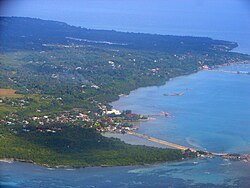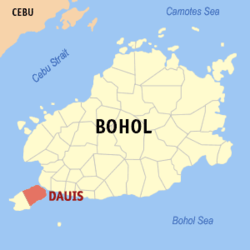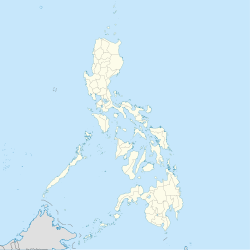This article has multiple issues. Please help improve it or discuss these issues on the talk page. (Learn how and when to remove these messages)
|
Dauis, officially the Municipality of Dauis (Cebuano: Munisipalidad sa Dauis; Tagalog: Bayan ng Dauis), is a municipality in the province of Bohol, Philippines. According to the 2020 census, it has a population of 52,492 people.[4] The town has many fine beaches, resorts, and a historic church, built in the 17th century. The Hinagdanan Cave is also a draw for tourists.
Dauis
Mariveles | |
|---|---|
| Municipality of Dauis | |
 Aerial view of Dauis, Panglao Island | |
 Map of Bohol with Dauis highlighted | |
| Coordinates: 9°37′30″N 123°51′54″E / 9.625°N 123.865°E | |
| Country | Philippines |
| Region | Central Visayas |
| Province | Bohol |
| District | 1st district |
| Founded | 1697 |
| Barangays | 12 (see Barangays) |
| Government | |
| • Type | Sangguniang Bayan |
| • Mayor | Roman B. Bullen |
| • Vice Mayor | Marietta T. Sumaylo |
| • Representative | Edgardo M. Chatto |
| • Municipal Council | Members |
| • Electorate | 31,781 voters (2022) |
| Area | |
• Total | 43.33 km2 (16.73 sq mi) |
| Elevation | 34 m (112 ft) |
| Highest elevation | 192 m (630 ft) |
| Lowest elevation | 0 m (0 ft) |
| Population (2020 census)[4] | |
• Total | 52,492 |
| • Density | 1,200/km2 (3,100/sq mi) |
| • Households | 11,522 |
| Economy | |
| • Income class | 4th municipal income class |
| • Poverty incidence | 14.01 |
| • Revenue | ₱ 165.3 million (2020), 69.97 million (2012), 79.01 million (2013), 92.34 million (2014), 98.31 million (2015), 121.5 million (2016), 130.9 million (2017), 144.3 million (2018), 157.4 million (2019), 175.3 million (2021), 239 million (2022) |
| • Assets | ₱ 413.1 million (2020), 90.44 million (2012), 102.6 million (2013), 114.6 million (2014), 145.7 million (2015), 194.7 million (2016), 259.8 million (2017), 314.6 million (2018), 380.9 million (2019), 467.2 million (2021), 517 million (2022) |
| • Expenditure | ₱ 138.8 million (2020), 65.17 million (2012), 68.63 million (2013), 76.9 million (2014), 77.14 million (2015), 89.86 million (2016), 89.73 million (2017), 103.8 million (2018), 114.1 million (2019), 123.1 million (2021), 195.6 million (2022) |
| • Liabilities | ₱ 59.78 million (2020), 16.86 million (2012), 19.21 million (2013), 19.97 million (2014), 22.83 million (2015), 39.55 million (2016), 48.7 million (2017), 56.96 million (2018), 70.28 million (2019), 44.08 million (2021), 53.02 million (2022) |
| Time zone | UTC+8 (PST) |
| ZIP code | 6339 |
| PSGC | |
| IDD : area code | +63 (0)38 |
| Native languages | Boholano dialect Cebuano Tagalog |
| Website | dauis |
History
editSpanish colonial era
editDauis is one of the oldest municipalities of Bohol, as attested by the discovery of early Chinese artifacts in the 1970s. All records of the town were destroyed in World War Two, however church records show the parish was established in 1697. The stone watchtower, now only ruins, was built in 1774.[6]
The first bridge between the poblacion of Dauis and Mansasa, Tagbilaran, was constructed by Spaniards during their reign, possibly in the 18th century. The bridge is still in place, used as a connection between the two islands. The other bridge was constructed near the old City Hall of Tagbilaran City, crossing towards Totolan. That bridge is known as 'the causeway' and leads as far as Panglao Beach resort about 17 kilometres (11 mi) from Tagbilaran.
American colonial era
editA deep well was constructed in Poblacion in 1900 by a Spanish leader where the well is now located, inside the Church below the altar. The locals provided the labor. The well depth is about 30 fathoms (55 m; 180 ft) and the diameter three metres (9.8 ft). The well was constructed through manual digging using bolos, crowbars, pulleys, and rope for digging into the soil stones, which contains limestone rock.
Geography
editDauis is located in the northern part of Panglao Island. It is 3 kilometres (1.9 mi) from Tagbilaran.
Barangays
editDauis is politically subdivided into 12 barangays. Each barangay consists of puroks and some have sitios.
|
|||||||||||||||||||||||||||||||||||||||||||||||||||||||||||||||||||||||||||||||||||||||||||||||||||||||||
Climate
edit| Climate data for Dauis, Bohol | |||||||||||||
|---|---|---|---|---|---|---|---|---|---|---|---|---|---|
| Month | Jan | Feb | Mar | Apr | May | Jun | Jul | Aug | Sep | Oct | Nov | Dec | Year |
| Mean daily maximum °C (°F) | 28 (82) |
29 (84) |
30 (86) |
31 (88) |
31 (88) |
30 (86) |
30 (86) |
30 (86) |
30 (86) |
29 (84) |
29 (84) |
29 (84) |
30 (85) |
| Mean daily minimum °C (°F) | 23 (73) |
22 (72) |
23 (73) |
23 (73) |
24 (75) |
25 (77) |
24 (75) |
24 (75) |
24 (75) |
24 (75) |
23 (73) |
23 (73) |
24 (74) |
| Average precipitation mm (inches) | 102 (4.0) |
85 (3.3) |
91 (3.6) |
75 (3.0) |
110 (4.3) |
141 (5.6) |
121 (4.8) |
107 (4.2) |
111 (4.4) |
144 (5.7) |
169 (6.7) |
139 (5.5) |
1,395 (55.1) |
| Average rainy days | 18.6 | 14.8 | 16.5 | 16.7 | 23.9 | 26.4 | 25.6 | 24.1 | 24.4 | 26.3 | 23.7 | 20.5 | 261.5 |
| Source: Meteoblue (Use with caution: this is modeled/calculated data, not measured locally.)[8] | |||||||||||||
Demographics
edit
|
|
| ||||||||||||||||||||||||||||||||||||||||||||||||||||||
| Source: Philippine Statistics Authority[9][7][10][11] | ||||||||||||||||||||||||||||||||||||||||||||||||||||||||
Economy
editPoverty Incidence of Dauis
10
20
30
40
50
2000
33.62 2003
13.52 2006
40.50 2009
30.12 2012
17.01 2015
14.43 2018
10.80 2021
14.01 Source: Philippine Statistics Authority[12][13][14][15][16][17][18][19] |
Culture
editThe town's 18th-century church, is dedicated to La Señora de la Asuncion or Our Lady of the Assumption. The church is believed to have been built of light materials by the first Spanish missionaries in 1697. Since then, the church has gone through several changes.
The image of the La Señora de la Asuncion is famed to be miraculous. Faithfuls come from near and far to hike the distance from the city to the site to invoke special petitions or mainly to honor the Patroness. In addition, at the foot of the altar of the church is a well also believed to have healing power. The water tastes fresh, despite the well's proximity to the seashore.
- 15 August
The town and all devotees of the La Señora de la Asuncion attend the Patroness' feast day every 15 August. Stories abound of the Patroness' sojourn and blessings. One of the stories tells of a man who found a camiseta (blouse) in his fishing boat after a lady passenger disembarked. On several occasions, devotees found the Patroness' camiseta full of amorseco. Many believe the Patroness must, on occasions, get down from her pedestal to visit them in their homes and farms. To this day, devotees continue to venerate and pay homage as manifestation of gratitude and appreciation after being healed of their ailments through the camiseta.
- Last Sunday of January
Another fiesta is celebrated last Sunday of January, to commemorate a miracle that happened many years back. It is said that many young girls have seen the lady waving her hands as if bidding them to come near.
Tourism
editDauis's major tourist attractions are Our Lady of Assumption Church and Hinagdanan Cave. Our Lady of Assumption Church is locally known as Señora de la Asunción. The church was built by Boholanos under forced labor imposed by the Spanish. It is constructed of solid rocks or stones and has paintings on the walls. There is a tower with a bell, outside the church another tower and also a small well. The front face of the church collapsed during the earthquake of 2013.
Gallery
edit-
Roman Catholic Church, Dauis
-
Bohol Plaza Resort, Dauis
-
Watchtower in Dauis
-
Panoramic view of Dauis
References
edit- ^ Municipality of Dauis | (DILG)
- ^ "2015 Census of Population, Report No. 3 – Population, Land Area, and Population Density" (PDF). Philippine Statistics Authority. Quezon City, Philippines. August 2016. ISSN 0117-1453. Archived (PDF) from the original on May 25, 2021. Retrieved July 16, 2021.
- ^ https://elevation.maplogs.com/poi/dauis_bohol_philippines.319119.html.
{{cite web}}: Missing or empty|title=(help) - ^ a b c Census of Population (2020). "Region VII (Central Visayas)". Total Population by Province, City, Municipality and Barangay. Philippine Statistics Authority. Retrieved 8 July 2021.
- ^ "PSA Releases the 2021 City and Municipal Level Poverty Estimates". Philippine Statistics Authority. 2 April 2024. Retrieved 28 April 2024.
- ^ "Attractions of Dauis Town Bohol Philippines". www.bohol-philippines.com. Retrieved 2022-11-22.
- ^ a b Census of Population and Housing (2010). "Region VII (Central Visayas)" (PDF). Total Population by Province, City, Municipality and Barangay. National Statistics Office. Retrieved 29 June 2016.
- ^ "Dauis: Average Temperatures and Rainfall". Meteoblue. Retrieved 9 May 2020.
- ^ Census of Population (2015). "Region VII (Central Visayas)". Total Population by Province, City, Municipality and Barangay. Philippine Statistics Authority. Retrieved 20 June 2016.
- ^ Censuses of Population (1903–2007). "Region VII (Central Visayas)". Table 1. Population Enumerated in Various Censuses by Province/Highly Urbanized City: 1903 to 2007. National Statistics Office.
- ^ "Province of". Municipality Population Data. Local Water Utilities Administration Research Division. Retrieved 17 December 2016.
- ^ "Poverty incidence (PI)". Philippine Statistics Authority. Retrieved December 28, 2020.
- ^ "Estimation of Local Poverty in the Philippines" (PDF). Philippine Statistics Authority. 29 November 2005.
- ^ "2003 City and Municipal Level Poverty Estimates" (PDF). Philippine Statistics Authority. 23 March 2009.
- ^ "City and Municipal Level Poverty Estimates; 2006 and 2009" (PDF). Philippine Statistics Authority. 3 August 2012.
- ^ "2012 Municipal and City Level Poverty Estimates" (PDF). Philippine Statistics Authority. 31 May 2016.
- ^ "Municipal and City Level Small Area Poverty Estimates; 2009, 2012 and 2015". Philippine Statistics Authority. 10 July 2019.
- ^ "PSA Releases the 2018 Municipal and City Level Poverty Estimates". Philippine Statistics Authority. 15 December 2021. Retrieved 22 January 2022.
- ^ "PSA Releases the 2021 City and Municipal Level Poverty Estimates". Philippine Statistics Authority. 2 April 2024. Retrieved 28 April 2024.


